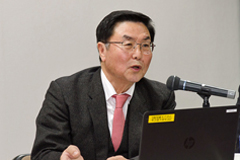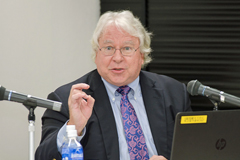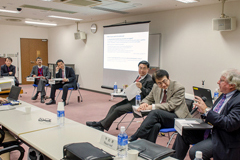Report Launch Seminar Looks at a Strategy for Industrial Development in Sub-Saharan Africa
2018.02.05
On Jan. 10, 2018, a launch seminar for “Training-Infrastructure-Finance (TIF) Strategy for Industrial Development in Sub-Saharan Africa,” which is a compilation of the research findings of the Research Group on Strategic Support for Industrial Development in Sub-Saharan Africa, was held at JICA Research Institute (JICA-RI). Approximately 80 people participated in the event, where discussion focused on the strategy for industrial development in Sub-Saharan Africa proposed in the report.
In his opening remarks, JICA-RI Director Naohiro Kitano said that the industrialization in Sub-Saharan Africa is the key to promoting job creation, poverty reduction and economic stabilization, and that it could lead to sustainable and inclusive growth. He introduced TIF strategy for achieving industrialization in Africa and explained that the report was the joint efforts of researchers and practitioners to implement the Institute’s slogan of being “the nexus between development practice and research.”
Next, Professor Keijiro Otsuka from Kobe University, one of the authors, gave an overview of the report. Otsuka began by pointing out that in order to achieve the Sustainable Development Goals (SDGs), it is imperative to develop manufacturing industries that provide ample job opportunities for the poor in developing countries. However, he said that there is no universally accepted effective strategy to do so by the United Nations, the World Bank, or even development economists. He then proposed TIF strategy to support industrial development in Sub-Saharan Africa, based on Japan’s assistance, which has bolstered growth in East Asia.

Professor Keijiro Otsuka from Kobe University
He explained that a unique feature of TIF strategy for industrial development policy is its logical sequence. As an investment in human capital, first, training (T) of entrepreneurs is conducted, then capable entrepreneurs with the potential to grow are screened. Next, investments (I) are made in infrastructure for industrial development, and financial support (F) is provided. It is important to increase the benefits of infrastructure investment and financing through the training that always comes first. TIF primes the pump of foreign direct investment (FDI), then subsequent continuation of cutting-edge technology and management training makes sustainable development possible. Otsuka also recommended implementation of Kaizen management training, which increases productivity in an inexpensive manner, for both management and labor, as a specific method of investing in human capital. He also described cases of the development of Kaizen specialists leading to the growth of entrepreneurs in Tanzania and Ethiopia.
In response to the presentation, John Page, Senior Fellow of the Brookings Institution, said that the manufacturing industry has traditionally been the prime mover in structural change, but tourism, the service industries, and other "industries without smokestacks" which stretch the boundaries of the manufacturing industry, are likely to increase their presence in the future. He argued that the challenge for policymakers will be to promote high-productivity sectors capable of absorbing large numbers of moderately skilled workers. Page also pointed out that it is necessary to incorporate a broad perspective with structural change at the nucleus into TIF strategy.

John Page, Senior Fellow of the Brookings Institution
A panel discussion followed. Visiting Scholar Go Shimada at JICA-RI served as moderator, and Tetsushi Sonobe (Professor at the National Graduate Institute for Policy Studies), Ken Odajima (Executive Senior Research Fellow at JICA-RI), and Hiroyuki Tomita (Senior Director, Industrial Development and Public Policy Department, JICA) participated as panelists, and the discussion proceeded from the points of view of either researchers or practitioners.
Sonobe responded to the question “What happens if a country does not follow the logical sequence of the proposed TIF strategy?” He explained that beginning support with financing is ineffective, since there are no human resources who can use the funds effectively or skillfully conduct business, so it is important to conduct training first. In response to the question “What is your evaluation of TIF strategy from the experience of Cambodia's economic development?” Odajima said, “Although TIF strategy was not intended to apply in the case of Cambodia, it has ultimately proceeded according to the TIF sequence. Cambodia is currently at the financing stage and growing well. Cambodia’s government is examining the development schemes for financing small and medium-sized companies, and there seems to have possibilities to find it in credit guarantee systems aside from two-step loans.” Tomita responded to the question, “Do you think the TIF is an effective strategy that JICA should consider in Africa?” “JICA has been carrying out projects which contain elements of related to “T” “I” and “F,””, however, just how we go about doing that is the challenge. Kaizen is now recognized by the World Bank to be effective for improving production capability and JICA and the World Bank are planning to evaluate the impact of the Kaizen project.

Participants discussed from the point of view of researchers or practitioners
Members of the audience asked questions and made comments, including “How do we achieve a balance between the local economy and the global economy?” and “We need to implement strategy in collaboration with various donors to bring about innovation.” Lively discussions continued until well after the scheduled end of the seminar.
Deputy Director Nobuko Kayashima at JICA-RI closed the seminar by expressing her hope that today’s seminar would provide the spark for discussions on industrial policy in Africa.
Download the report here:

事業事前評価表(地球規模課題対応国際科学技術協力(SATREPS)).国際協力機構 地球環境部 . 防災第一チーム. 1.案件名.国 名: フィリピン共和国.

事業事前評価表(地球規模課題対応国際科学技術協力(SATREPS)).国際協力機構 地球環境部 . 防災第一チーム. 1.案件名.国 名: フィリピン共和国.

事業事前評価表(地球規模課題対応国際科学技術協力(SATREPS)).国際協力機構 地球環境部 . 防災第一チーム. 1.案件名.国 名: フィリピン共和国.

事業事前評価表(地球規模課題対応国際科学技術協力(SATREPS)).国際協力機構 地球環境部 . 防災第一チーム. 1.案件名.国 名: フィリピン共和国.

事業事前評価表(地球規模課題対応国際科学技術協力(SATREPS)).国際協力機構 地球環境部 . 防災第一チーム. 1.案件名.国 名: フィリピン共和国.
scroll